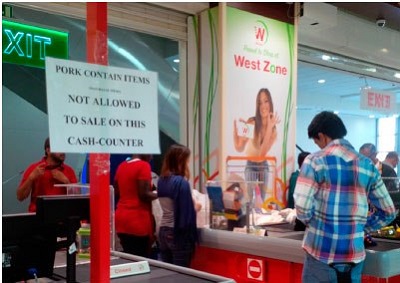Dubai, 9 Rabi’ul Akhir 1436/30 January 2014 (MINA) — The Dubai Municipality has given a six-month deadline to outlets selling pork products to have separate cash counters for billing these products, a senior official has said.
A senior official at the Food Control Department told Khaleej Times that the municipality last week sent out a circular to supermarkets, hypermarkets etc to have dedicated counters for billing halal and non-halal products.
“It’s been a requirement for long and we are strictly implementing it as per our new inspection policy,” he said, khaleejtimes quoted by Mi’raj Islamic News Agency (MINA) as reporting.
The official said many shops already had separate cash counters at the designated sections for non-halal food items.
Also Read: Packaging Industry Supports Halal Ecosystem
Those who do not have this facility are now being asked to strictly follow the specifications set for the non-halal items, which also include proper wrapping and labelling.
“It’s not only a matter of addressing ethics and customer satisfaction, it’s also to prevent cross contamination from meat products to other food items.”
Fines ranging from Dh5,000 to Dh20,000 will be imposed on shops not complying with the rule.
While some shops have started dedicating a single counter for non-halal products, some others with a larger clientele of pork consumers are dedicating one counter for billing halal products.
Also Read: 7th World Halal Summit Held in Istanbul
The floor manager of a West Zone supermarket, which has dedicated one counter for halal products, said the shop plans to arrange a billing counter for pork products inside the area designated for them.
“Till then, we are letting customers who are not comfortable with billing their purchases at the same counter to use this counter,” he said. “We have dedicated a counter for halal products because we have more customers who buy pork items and also we have not found customers who have any issues in billing halal and non-halal products from the same counter. Those who do not like it can now use this dedicated counter for them,” he said.
The move evoked mixed response from Muslim and non-Muslim customers.
People like Nabil Kayali, a Jordanian general manager of a transport equipment rental company, and Shamima Fowzee, a teacher from Bangladesh, said the cash counter for non-halal products should be kept in the area designated for them, rather than amidst the general counters.
Also Read: Halal Tourism Pays Attention to Tourist Comfort
T. M. Ibrahim, a Sudanese administrator, said he would not mind halal and non-halal products being billed at the same counter, provided the pork items are properly sealed and not leaking. “I have hardly seen Muslims complaining about this billing issue,” he said.
Roshan Pereira, an Indian workshop manager who loves dishes with the meat, said it was a welcome move.
“I have wondered on many occasions if a Muslim customer standing behind me would find it uncomfortable to bill his purchase after I pay for the pork I bought from the same counter,” said Pereira who appreciates Dubai allowing non-Muslims to have their choice of food.
Khagendra Dhamala, a Nepalese chef who was seen purchasing pork, also felt it was “fair to be sensitive to the interests and beliefs of all nationalities and believers”.
Also Read: Sheikh Watteau Supports Philippine Halal Certification Through ISO
However, Niranjan Das, a pure vegetarian, said such rules should be sensitive to the sentiments of vegetarians also.
A.P. Radhakrishnan, an accountant who does not eat pork, said he did not support the idea of discriminating consumers based on their eating habits. “If you don’t like pork products, why go to shops that sell them. We have more shops here that do not sell pork,” he observed.(T/P009/P3)
Mi’raj Islamic News Agency (MINA)
Also Read: Indonesia-Brunei Discuss Increasing Halal Meat Exports




































 Mina Indonesia
Mina Indonesia Mina Arabic
Mina Arabic